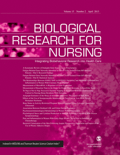
Biological Research for Nursing
Scope & Guideline
Exploring the biological foundations of patient care.
Introduction
Aims and Scopes
- Integration of Biological and Nursing Sciences:
The journal emphasizes research that merges biological sciences with nursing, exploring how biological factors influence health outcomes and inform nursing practices. - Focus on Patient-Centered Interventions:
Research articles often investigate interventions that prioritize patient needs, preferences, and experiences, ensuring that care strategies are tailored to individual patients. - Systematic Reviews and Meta-Analyses:
A significant portion of published research includes systematic reviews and meta-analyses, providing comprehensive evaluations of existing evidence to guide nursing practice. - Multidisciplinary Approaches:
The journal encourages studies that employ multidisciplinary methodologies, integrating insights from genetics, microbiology, psychology, and other fields to address complex health issues. - Emphasis on Chronic Conditions and Aging:
Research frequently addresses the management of chronic conditions and the health care needs of aging populations, reflecting the growing importance of these topics in nursing. - Innovative Research Methodologies:
The journal highlights the use of innovative research designs, including randomized controlled trials, observational studies, and qualitative research, to advance nursing knowledge.
Trending and Emerging
- Gut Microbiome and Health:
An increasing number of studies are focusing on the gut microbiome's role in various health conditions, including its impact on mental health, chronic diseases, and recovery from illness, showcasing its relevance to nursing practice. - Mind-Body Interventions:
Research on mind-body interventions, such as yoga and mindfulness, is trending, reflecting a growing interest in holistic approaches that address both psychological and physiological health. - Social Determinants of Health:
There is a rising emphasis on research that explores how social determinants affect health outcomes, particularly among vulnerable populations, highlighting the need for nurses to address broader health disparities. - Biomarkers and Personalized Medicine:
The exploration of biomarkers for predicting health outcomes and tailoring interventions is gaining momentum, aligning with the trend towards personalized medicine in healthcare. - Telehealth and Digital Health Interventions:
With the increasing reliance on technology in healthcare, studies investigating telehealth interventions and their effectiveness in nursing practice are becoming more common, reflecting modern healthcare delivery models. - Chronic Disease Management:
Research focusing on innovative strategies for managing chronic diseases, particularly in elderly populations, is on the rise, addressing the growing burden of these conditions on healthcare systems.
Declining or Waning
- Traditional Pharmacological Interventions:
Research centered on conventional pharmacological treatments is becoming less prevalent, with a noticeable shift towards exploring non-pharmacological interventions and holistic approaches. - Basic Biological Mechanisms in Isolation:
There is a waning emphasis on studies that solely investigate biological mechanisms without considering their implications for nursing practice, reflecting a broader push for translational research. - Single-Factor Studies:
Research examining the effects of a single biological factor on health outcomes is declining, as there is a growing recognition of the complexity of health issues that require multifactorial approaches. - Focus on Acute Care Settings:
The journal is increasingly prioritizing studies that address chronic conditions and long-term care over those focused on acute care settings, signaling a shift in research priorities. - Historical and Descriptive Studies:
There has been a noticeable reduction in the publication of purely descriptive studies that do not contribute to a deeper understanding of the biological and nursing interconnections.
Similar Journals

Australian Journal of Advanced Nursing
Fostering Excellence in Advanced Nursing EducationThe Australian Journal of Advanced Nursing, published by the Australian Nursing Federation, has established itself as a vital resource in the fields of nursing and advanced nursing practice since its inception in 1983. With an ISSN of 0813-0531 and an E-ISSN of 1447-4328, this peer-reviewed journal aims to disseminate high-quality research, innovative practices, and critical reviews that contribute to the advancement of nursing knowledge and education. With a commendable impact factor and currently positioned in the Q2 quartile in both Advanced and Specialized Nursing and miscellaneous Nursing categories as of 2023, the journal is ranked among the top publications in the field, reflecting its significance and influence in shaping nursing practices and policies in Australia and beyond. The journal provides open access options for a wider readership while specializing in progressive topics that address contemporary challenges in nursing, thus serving researchers, practitioners, and educators alike. It continues to be a cornerstone for advancing the professional development of nursing disciplines, supporting a community that thrives on evidence-based practice and interdisciplinary collaboration.
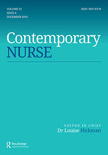
Contemporary Nurse
Championing evidence-based nursing for impactful healthcare.Contemporary Nurse is a leading journal in the field of nursing, published by Routledge Journals, Taylor & Francis Ltd. With a commitment to advancing healthcare practice through innovative research, this journal serves as an essential resource for nursing professionals, researchers, and students alike. Its Q2 ranking in the field underscores its influence and significance, placing it among the top journals within its category. The journal covers a broad scope of topics within nursing, ensuring that it remains relevant to contemporary healthcare challenges. The journal, which has been in publication since 1992, welcomes a diverse range of articles that contribute to nursing education, practice, and policy. While it does not currently offer open access, articles are accessible through institutional subscriptions. As the nursing field continues to evolve, Contemporary Nurse remains a vital platform for scholars and practitioners to disseminate groundbreaking research and engage with new ideas.
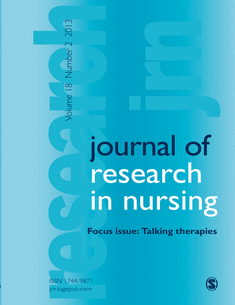
Journal of Research in Nursing
Transforming Nursing Practice Through Scholarly ContributionsJournal of Research in Nursing, published by SAGE Publications Ltd, is an esteemed academic journal housed in the United Kingdom that has been at the forefront of nursing research since its inception in the mid-1990s. With its robust focus on innovative research and theoretical foundations in the nursing discipline, the journal has achieved a prestigious Q1 ranking in the category of Research and Theory in 2023, underscoring its critical role in advancing nursing science. The journal's Scopus ranking is equally impressive, holding the top position in its category with a remarkable 97th percentile. It serves as an essential hub for scholars, practitioners, and students alike, aiming to disseminate cutting-edge findings and foster dialogue among the nursing community. While it currently operates under a subscription model, the journal’s commitment to academic excellence and significant contributions to nursing education and practice make it indispensable reading for anyone engaged in the field.
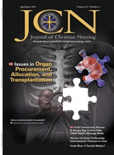
Journal of Christian Nursing
Transforming Care with Faith and CompassionThe Journal of Christian Nursing, published by LIPPINCOTT WILLIAMS & WILKINS, serves as a vital interdisciplinary platform advancing the intersection of nursing practice and Christian faith. Since its inception in 1984, the journal has provided a unique forum for the dissemination of insightful research, evidence-based practices, and reflective essays, fostering a holistic approach to nursing that emphasizes spiritual care. With an ISSN of 0743-2550 and an E-ISSN of 1931-7662, it reaches a dedicated audience of nursing professionals and scholars, while operating within the broader context of nursing and healthcare disciplines, garnering a Q4 ranking in Medicine (Miscellaneous) for 2023. Although not an open-access publication, the journal plays a crucial role in shaping conversations around the ethical and spiritual dimensions of care, encouraging nursing professionals to integrate their faith and practice. With its commitment to relevant, quality research, the Journal of Christian Nursing continues to be an essential resource for those seeking to enrich their professional practice through the dual lenses of medicine and spirituality.
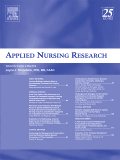
APPLIED NURSING RESEARCH
Championing Excellence in Nursing Research and PracticeApplied Nursing Research is a premier journal dedicated to the dissemination of high-quality research within the nursing field, published by W B Saunders Co-Elsevier Inc. With an impact factor that places it in the Q1 category for Nursing (miscellaneous), this journal ranks 23rd out of 139 in its Scopus category, firmly establishing itself in the top percentile (83rd). Since its inception in 1988, Applied Nursing Research has provided a vital platform for sharing innovative findings that impact clinical practice and healthcare delivery. The journal serves as an essential resource for researchers, professionals, and students aiming to enhance their knowledge and application of nursing practices. While it does not offer open access, it remains a crucial publication for those seeking to explore contemporary nursing topics and research trends through a rigorous academic lens.

Worldviews on Evidence-Based Nursing
Exploring diverse perspectives in nursing research.Worldviews on Evidence-Based Nursing, published by WILEY, is a premier journal dedicated to advancing the field of nursing through the dissemination of high-quality research and innovative practices. With an impressive impact factor and recognition as a Q1 journal in both Medicine (miscellaneous) and Nursing (miscellaneous), this journal stands at the forefront of evidence-based nursing, providing a vital platform for researchers and professionals to share their findings. Established in 2004, the journal has continually fostered an interdisciplinary approach, welcoming submissions that reflect diverse perspectives within nursing and healthcare. While it does not currently offer open access, its rigorous peer-review process ensures that published articles meet the highest standards of scientific excellence. As the journal moves toward its converged years of publication until 2024, it remains committed to shaping the future of nursing practice through evidence and inquiry, making it an essential resource for dedicated scholars and practitioners alike.
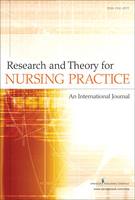
Research and Theory for Nursing Practice
Championing research-driven nursing practices.Research and Theory for Nursing Practice, published by SPRINGER PUBLISHING CO, is a pivotal journal in the field of nursing research and theory, dedicated to advancing the discipline through rigorous empirical investigation and theoretical exploration. With an ISSN of 1541-6577 and an E-ISSN of 1945-7286, it serves as a platform for nursing professionals, researchers, and students seeking to disseminate innovative ideas and evidence-based practices. Established in 2002, the journal continues to contribute significantly to the academic community, featuring articles that are aligned with contemporary challenges and developments in nursing practice. Although categorized as Q4 in Medicine (miscellaneous) and Q3 in Research and Theory in 2023, it holds a respected position within the nursing field, ranking #14 out of 18 in Scopus Nursing research and Theory. The journal emphasizes the importance of integrating research findings into clinical practice and is committed to fostering a meaningful dialogue among nursing scholars. Access is not open, allowing for a curated collection of high-quality research that is essential for enhancing nursing education and patient care. The journal's convergence from 2002 to 2024 showcases its enduring relevance, making it a crucial resource for those aiming to shape the future of nursing.
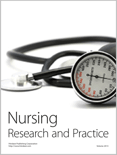
Nursing Research and Practice
Exploring evidence-based solutions in nursing.Nursing Research and Practice, an esteemed open-access journal published by HINDAWI LTD, serves as a vital resource in the field of nursing, providing a platform for the dissemination of innovative research and practice methodologies. With its ISSN 2090-1429 and E-ISSN 2090-1437, this journal has maintained a commendable presence in the academic community since its inception in 2010. Based in Egypt, it is positioned within the Q2 category of Nursing (miscellaneous) and ranks #47/139 in General Nursing according to Scopus, placing it in the 66th percentile. The journal is committed to advancing nursing science and facilitating an evidence-based approach to practice, encouraging contributions that explore the full spectrum of nursing discipline. As a vital reference for researchers, healthcare professionals, and students alike, Nursing Research and Practice not only keeps its audience informed but also promotes innovative practices to enhance patient care across diverse settings.
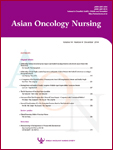
Asian Oncology Nursing
Pioneering Research in Oncology Nursing Across the ContinentAsian Oncology Nursing is a pivotal journal dedicated to advancing the field of oncology nursing across the Asian continent and beyond. Published by the esteemed Korean Oncology Nursing Society, this journal serves as a platform for researchers, clinicians, and educators to disseminate groundbreaking findings and innovative practices in cancer care and nursing. With an ISSN of 2287-2434 and E-ISSN 2093-7776, it is committed to enhancing the knowledge and skills of oncology nursing professionals, thereby improving patient outcomes. Although currently not operating as an open-access platform, the journal emphasizes the significance of bridging the research gap in oncology nursing, fostering collaboration among professionals in the field. Given the increasing importance of culturally competent care in oncology, Asian Oncology Nursing positions itself as an essential resource for those who strive to elevate standards of care and educate future generations of oncology nurses.
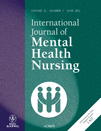
International Journal of Mental Health Nursing
Transforming mental health care with original research and reviews.International Journal of Mental Health Nursing is a prestigious peer-reviewed journal published by WILEY, dedicated to advancing the field of mental health nursing. With an ISSN of 1445-8330 and E-ISSN 1447-0349, the journal serves as a vital resource for researchers, clinicians, and educators within the psychiatry and mental health sectors. Ranked in the top Q1 quartile and recognized as Rank #4 out of 45 in the Nursing - Psychiatric Mental Health category, it boasts an impressive 92nd percentile ranking in Scopus metrics, underscoring its influence and reach within the academic community. Emphasizing original research, systematic reviews, and innovative clinical practices, the journal aims to bridge the gap between theory and practice, ultimately enhancing mental health care. The journal’s commitment to disseminating high-quality research ensures that it is an essential publication for anyone engaged in the evolving landscape of mental health nursing.